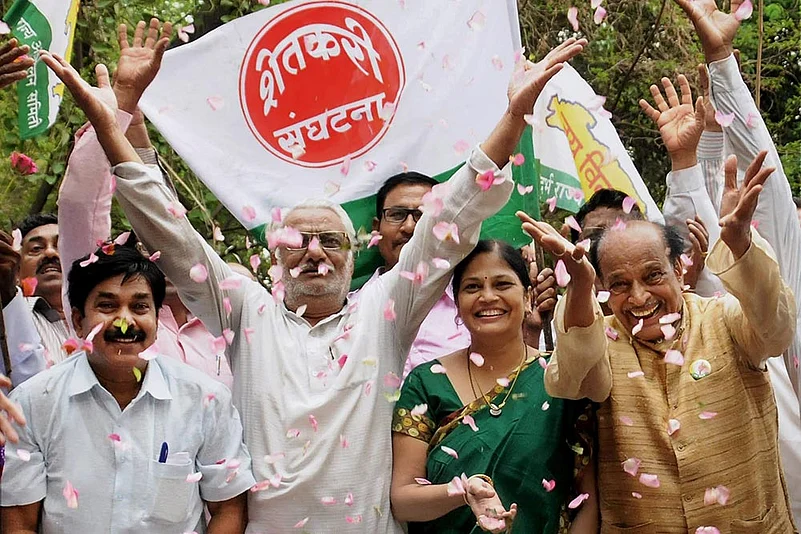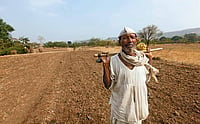The “historic” loan waiver announced by Maharashtra CM Devendra Fadnavis following farmers’ strikes and demonstrations would cost the state exchequer an estimated Rs 30,000 crore to Rs 1 lakh crore. Announced in the backdrop of pressure from allies like Shiv Sena and Swabhimani Shetkari Sanghatana as well as the Opposition Congress and NCP, the promised pay-outs vary from the entire loan for small farmers to Rs 1 lakh for all farmers. The state government is holding meeting after meeting to chalk out a viable plan before July 25.
Fadnavis, who has been opposed to the idea of a waiver, hastened to include all farmers and all loans after the first meeting with the protesting farmers. The committee that has been appointed to see the waiver through is non-committal on how it will be executed. What the government has surely agreed to so far is just that every small or marginal farmer should get a crop loan up to Rs 10,000 for the current sowing season, to which the banks have already objected.
“We are talking to all senior ministers so that everyone is on board,” says revenue minister Chandrakant Patil, who is also heading the committee to look into the execution of the waiver. “I met Uddhav Thackeray (Shiv Sena) and Sharad Pawar (NCP), besides discussing the issue with Raju Shetti (Swabhimani Paksha).” According to finance minister Sudhir Mungantiwar, everything will be clear by July 25. “We have appointed different committees to determine the criteria for eligibility and the amount to be waived. It is too early to specify how much will be disbursed and how,” says Mungantiwar. The cut-off date for loans to be waived and eligibility in terms of land-holdings and other income sources are to be decided, which will require tedious detailing and sorting. Shiv Sena leader Subhash Desai says, “They met Uddhavji and discussed how to implement the waiver. We will see to it that it is executed.”
There is pressure on the administration as the protesting farmers took to blocking supplies of milk and vegetables to the cities, forcing politicians of all hues to announce their support for the demand to waive all loans to all farmers, citing the recent Uttar Pradesh loan waiver as an example. No wonder the BJP had little choice but to declare an “in-principle” blanket waiver “for all”, for which all parties are claiming credit. According to the CM’s press release, there are 31 lakh defaulters in the state. “We have managed to ensure everyone is included,” says Shetti. “The details will be worked out.”
Indeed, much depends on the details. “Government employees who own land should not get the benefit,” says Amar Habib, an activist of the Kisanputra Andolan. “If everyone with other sources of income is excluded, it would save the exchequer at least Rs 20,000 crore of the estimated cost of Rs 30,000 crore. In fact, the children of farmers in our group, who are employed elsewhere, have decided to forego this waiver. This filtering is crucial.”
Economists and banking experts warn against the burden on the state exchequer as the entire amount will have to be provided by the state and nothing from the Centre, which has made it clear that funds for loan waivers have to be arranged by the states. “This is taking the state closer to bankruptcy,” says Girish Kuber, editor, Loksatta. “Maharashtra is the single largest loser after GST comes into force. We are yet to recover from the drastic impact of demonetisation. Mungantiwar has also promised reimbursements to municipal corporations. Then there is the burden of the seventh pay commission. The deficit of the state is going to double.” Patil agrees and says, “I can’t mention the numbers as yet, but it will surely be difficult to handle a waiver of Rs 30,000 crore plus.”
Desai says, “The Centre should have helped. Moreover, only the Centre can deal with the issue of minimum support price.” While economic compulsions do make the blanket loan waiver a tough fiscal challenge for the state, political pressures will perhaps force the government to implement it. Farmers’ activists, however, argue that unless systemic issues are addressed, the waiver can be a temporary relief at best—like the first showers of rain, which yield hope, but not necessarily a good crop.
By Prachi Pinglay-Plumber in Mumbai


























